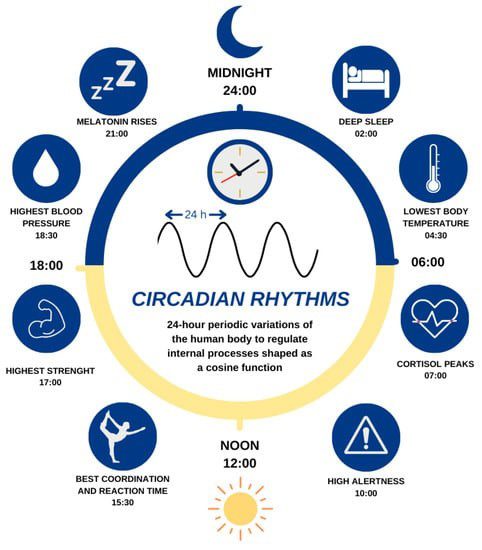
What is Circadian Rhythm and How Day Time Light Savings causes deleterious health problems
Understanding the relationship between circadian rhythms and DST can help individuals better prepare for and manage the biannual time changes, potentially reducing their negative impact on health and well-being.

Figure 1: Illustrates how Circadian rhythm regulates different body functions and even our moods during a 24 hour cycle.
Circadian rhythm is the body’s internal 24-hour clock that regulates various biological processes, including sleep-wake cycles, hormone production, and body temperature. This natural rhythm is primarily influenced by light and darkness, with the brain’s suprachiasmatic nucleus acting as the master clock that coordinates these cycles throughout the body[1][5].
The circadian system plays a crucial role in maintaining our overall health and well-being. It helps regulate important functions such as:
– Sleep patterns
– Hormone release
– Core body temperature
– Metabolism
– Cognitive function
– Immune system activity
Daylight Saving Time (DST) can significantly disrupt our circadian rhythms, particularly during the spring transition when we “spring forward” and lose an hour of sleep. This abrupt change causes a misalignment between our internal biological clock and the external environment.
The effects of DST on circadian rhythms include:
1. Sleep disruption: The time change can lead to difficulty falling asleep and waking up at the desired times, resulting in sleep deprivation and fatigue.
2. Circadian misalignment: DST shifts our exposure to light, causing a mismatch between our internal clock and the external day-night cycle. This can lead to a phenomenon known as “social jet lag”[24][25].
3. Increased health risks: Studies have shown that the DST transition is associated with a modest increase in cardiovascular events, particularly in the first week after the spring shift. This may be due to the stress placed on the body by the sudden change in sleep patterns and circadian rhythms.
4. Reduced productivity and safety: The disruption to our sleep-wake cycle can lead to decreased alertness, cognitive performance, and an increased risk of accidents in the days following the time change.
5. Longer adaptation period: While some people may adjust to the time change within a few days, others may take weeks to fully adapt their circadian rhythms to the new schedule.
To mitigate the negative effects of DST on circadian rhythms, experts recommend:
– Gradually adjusting sleep schedules in the days leading up to the time change
– Maintaining consistent sleep and wake times, even on weekends
– Exposing yourself to natural light in the morning to help reset your internal clock
– Avoiding bright lights and screens in the evening, especially before bedtime
– Practicing good sleep hygiene, such as creating a relaxing bedtime routine
While DST was originally implemented to conserve energy and make better use of daylight hours, its impact on circadian rhythms and overall health has led many experts to question its continued practice. We advocate adopting permanent standard time, which they argue would be more aligned with our natural biological rhythms. Pick up your phone and ask your congressman to make keeping the permanent standard time a national law.
